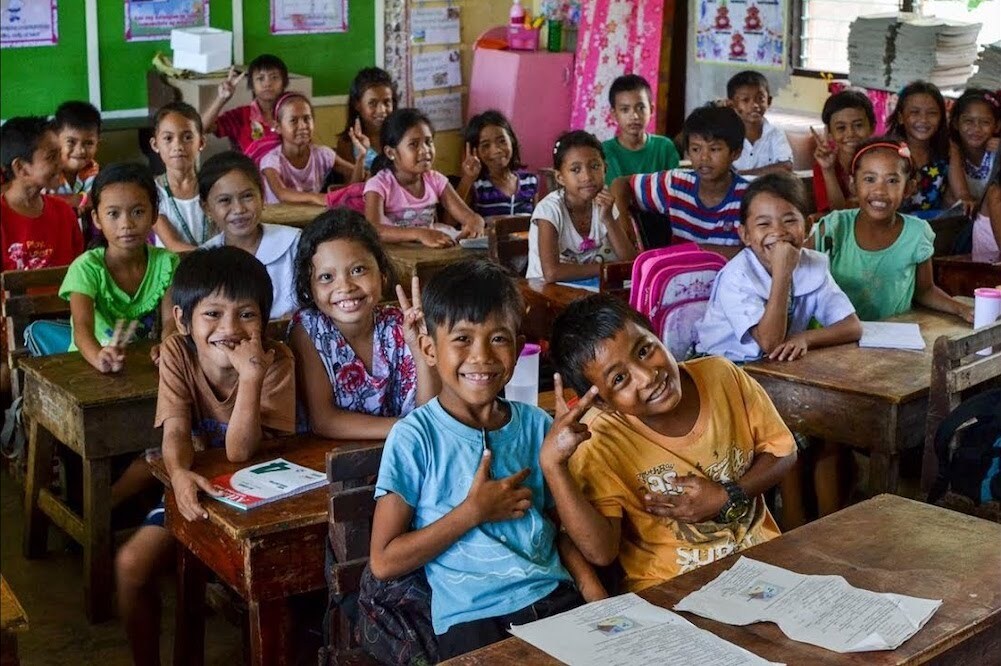Five things you need to know this week about global education

After 20 months, schools are beginning to reopen for 27 million students in the Philippines - plus a bold plan to expand school meals to every child in need.
Philippines re-opens schools slowly after lengthy shutdown
Thousands of children in the Philippines returned to school on Monday for the first time in 20 months.
A pilot scheme has resumed face-to-face learning after the pandemic disrupted the education of 27 million students. It involves 100 public schools in lower-risk areas holding classes for two months.
The Philippines imposed some of the world’s longest lockdowns and is among the last countries to re-open schools.
“We are happy to see our learners inside our classrooms as we recognise the significance of face-to-face learning in their social development,” the education ministry said in a statement. Authorities have reduced class sizes by half and allowed only vaccinated teachers and school personnel to interact with students.
The availability of computers, phones and internet, and the uneven quality of education have been among the challenges for remote learners in the Philippines, where some children have had to climb on roofs to get data signals.
Global plan to expand school meals
United Nations agencies have backed an international coalition that aims to rapidly improve the nutrition, health and education of school-age children following school closures.
The pandemic caused extensive disruption to education and more than 150 million children are still missing out on meals, as well as essential health and nutrition services.
Five agencies have committed to assist the School Meals Coalition, a group of more than 60 countries led by France and Finland. They want to give every child in need a nutritious meal in school by 2030 to help them grow and learn.
The coalition will work to restore the level school meals that were in place before the pandemic and then expand these to reach 73 million children who were not covered before Covid-19 hit.
Malala doubts Taliban vow on girls’ education
Malala Yousafzai says she fears many Afghan girls will not be able to return to school – despite claims from the Taliban that they will reopen classes.
She was a schoolgirl in Pakistan when the Taliban shot her in the head in 2012 for campaigning on the rights of girls to an education.
On the BBC’s Andrew Marr show, she said: “I’m afraid that this ban that they have announced right now that they’re calling temporary might not actually be temporary.”
Malala said the Taliban introduced a similar “temporary” ban on girls’ education in 1996, which ended only when they were toppled from power five years later.
Learning projects win UNESCO prize
A literacy project in Ghana, a programme on media for social change in Palestine and a school that helps protect Indigenous cultures in Peru have been awarded this year’s UNESCO-Japan Prize on Education for Sustainable Development. They each received $50,000 to scale up their programmes.
World Vision Ghana was chosen for its approach to the development of literacy. It aims to empower primary school children to think critically about local issues and take actions, as well as to make reading exciting through multi-lingual education.
In remote areas of the Sacred Valley of the Incas in Peru, Kusi Kawsay Andean School and Ñawpa Ñan Cultural Events have been promoting the protection and preservation of Indigenous people’s rights, culture, values and livelihoods over the past decade.
The Media Development Center at Birzeit University in Palestine took a youth-centred approach to generate change through dialogue and cooperation.
Air pollution closes Indian schools
A one-week shutdown of schools in New Delhi has been extended indefinitely to protect students from increasing air pollution.
There has been a sharp increase in the number of children being hospitalised with breathing problems. Air quality has declined due to crop stubble burning, emissions from transport, coal-fired plants outside the city and other industry, as well as open rubbish burning and dust.
The Indian capital’s chief minister Arvind Kejriwal said: “For a week from Monday onwards, schools will be physically closed but will continue virtually so that children don’t have to breathe polluted air.” But that closure was quickly extended.
Arvind Bountra, head of paediatrics at the city’s Max Super Speciality Hospital, said: “There is some study that shows that the cognitive functions of the brain (among children) are also affected by these very small particles.”